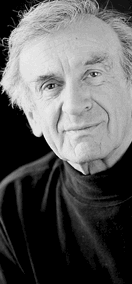Reflections on Elie Wiesel
- Tuesday, 05 July 2016 19:08
- Last Updated: Thursday, 07 July 2016 07:37
- Published: Tuesday, 05 July 2016 19:08
- Joanne Wallenstein
- Hits: 5127
 As long as one dissident is in prison, our freedom will not be true. As long as one child is hungry, our life will be filled with anguish and shame. What all these victims need above all is to know that they are not alone; that we are not forgetting them, that when their voices are stifled we shall lend them ours, that while their freedom depends on ours, the quality of our freedom depends on theirs. –Elie Wiesel
As long as one dissident is in prison, our freedom will not be true. As long as one child is hungry, our life will be filled with anguish and shame. What all these victims need above all is to know that they are not alone; that we are not forgetting them, that when their voices are stifled we shall lend them ours, that while their freedom depends on ours, the quality of our freedom depends on theirs. –Elie Wiesel
Elie Wiesel passed away on July 2, 2016. Rabbi Brown of Scarsdale Synagogue wrote the following about Wiesel which he shared with his congregants on July 4:
Dear Friends:
Greetings. I hope your Fourth of July has been meaningful... I trust, by now, that you have heard that Elie Wiesel, the noted author, scholar and activist, died this weekend. May his name live on to be for a blessing.
There is something poignant about noting his passing on this Fourth of July. His story, more than most, reminds us how preciously blessed we are to live in a country that enables us to be free. Let us never take that freedom for granted.
Wiesel is not our most important Jewish philosophical response to modern anti-Semitism. Theodor Herzl's writing (The Jewish State and Altneuland) - predating Wiesel and the Holocaust by forty years - grapples with the enduring discrimination of the Jewish People, and suggests that the founding of a Jewish State is a solution to it. And we have someone like Simon Wiesenthal (in The Sunflower) who raises the impossible question of forgiveness as it relates to the Holocaust itself.
Wiesel's genius was in his ability to bring his own personal story - and our people's collective story - to the people of the world. Because of his voice...how he used it in his own writing, and in the lectures and speeches that he delivered for decades...those inside and outside of the Jewish community were able to hear him, and listen to him, and learn from him.
No one in the (Jewish) world I grew up in ever mentioned Theodor Herzl or Simon Wiesenthal to me. I had a vague memory of a Holocaust survivor or two who spoke at my synagogue when I was younger. But the Holocaust was something inchoate and distant from me, until the Literature faculty of my mostly-non-Jewish high school in South Jersey had me read Wiesel's Night.
Suddenly - in the space of time that it took me to absorb his shocking and disturbing and heart-wrenching narrative - I had a new understanding of what it meant to be Jewish and what it meant to be human. Everything changed for me because of Wiesel, his story, and his book.
Because of his life's work, we have a sharper understanding of our past. And because of his life's work, we have a sharper understanding of our future, and the sense of responsibility that is an inherent Jewish part of living in a post-Holocaust world.
Officially, I want to encourage you to read Night if you haven't done so yet.
Beyond that: check out these two links that I hope you'll take a few minutes to explore to get a sense of Wiesel's unique and important voice:
In 2006, Oprah Winfrey chose Night as one of her Book Club's official selections. (There is no doubt that millions of new readers who might never have encountered Wiesel and the Holocaust did so because of Oprah's selection.) Click here for a brief video of the visit that Oprah made that year to tour Auschwitz with Wiesel.
In 2008, Wiesel participated in the public radio essay series "This I Believe." Click here for the full text and audio of his important reflection.
With gratitude for this festive day in which we celebrate our Freedom and Independence,
Rabbi Jeffrey Brown














